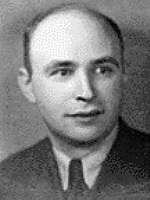Gustav Bergmann (science theorist)
Gustav Bergmann (born May 4, 1906 in Vienna , † April 21, 1987 in Iowa City , USA ) was an Austrian scientific theorist and philosopher .
Life
Gustav Bergmann matriculated after graduating from high school to study mathematics and philosophy at the University of Vienna . Even before completing his doctorate in mathematics in 1928 on the subject of contributions to metric differential geometry , his former classmate Kurt Gödel introduced him to the Vienna Circle , where Bergmann was particularly influenced by Moritz Schlick , Friedrich Waismann and Rudolf Carnap . From 1929 to 1930 Bergmann taught mathematics at the Vienna Realschule and in the following years went to Berlin , where he worked as an assistant to Albert Einstein .
Increasingly discouraged by the constant discrimination against Jews at German universities, Bergmann went back to Vienna, where he studied law and was awarded a Dr. jur. completed. He then took a job in a law firm.
After Austria was annexed to Nazi Germany in 1938, Bergmann emigrated to the USA with the help of Albert Einstein and the financial support of Otto Neurath, a member of the Vienna Circle .
As early as 1939 he received an assistant position to the psychologist Kurt Lewin at the University of Iowa . Bergmann worked here on an investigation into the mathematical representation of Lewin's psychological field theory. In 1940 Bergmann became an assistant professor, and from 1950 a full professor of philosophy and psychology at the Department of Philosophy at the University of Iowa in Iowa City . Bergmanns began with his essay Pure Semantics, Sentences, and Propositions , published in 1944 in the Journal of Symbolic Logic , which critically examined Carnap's semantic theory and responded to Carnap with the reply Hall and Bergmann on Semantics ( Mind 54, 214, 1945) Turning away from the circle of logical empiricism : Already the title of Bergmann's duplicate, A Positivistic Metaphysics of Consciousness ( Mind 54, 215, 1945), expresses that Bergmann now started to regard Carnap's avowed anti-metaphysical position as a form of metaphysics worthy of criticism .
Especially in the 1960s and 1970s, Bergmann had a great influence on contemporary philosophy, especially in the areas of ontology and epistemology , so that the Philosophy Department of the University of Iowa became one of the leading philosophical institutes in the USA. This led to the fact that it attracted outstanding students not only from the USA ( Laird Addis , Herbert Hochberg , Reinhardt Grossmann , L. Nathan Oaklander and others); From their midst, a separate philosophical school was formed, which is now sometimes referred to as the " Iowa School " or the " Iowa Realists ". He is considered to be the inventor of the term " linguistic turn ".
In 1967 Gustav Bergmann was elected President of the American Philosophical Association (Western Division). In 1972 he was honored with the Carver Professorship of the College of Liberal Art at the University of Iowa. Bergmann retired in 1974 and died in 1987.
Bergmann is now considered a classic in contemporary analytically oriented ontology. On his 100th birthday, international congresses were held in Iowa City, Paris and Rome. The International Gustav Bergmann Society was founded during the 2006 Congress in Paris .
Fonts
- The Philosophy of Science. Wisconsin 1966.
- The Metaphysics of Logical Positivism. Wisconsin 1954.
- Meaning and Existence. Wisconsin 1959.
- Logic and Reality. Wisconsin 1964. (online: Chapter Realistic Postscript ) ( Memento from February 4, 2012 in the Internet Archive )
- Realism: A Critique of Brentano and Meinong. Wisconsin 1967.
- William Heald, Edwin B. Allaire (Eds.): New Foundations of Ontology. Wisconsin 1992.
- Erwin Tegtmeier (Ed.): Gustav Bergmann. Collected papers. 3 volumes. ontos, Heusenstamm. Volume I: Selected Papers 1. 2003. Volume II: Selected Papers 2. 2004. Volume III: Realism. 2004.
literature
- Moltke S. Gram , ED Klemke (Ed.): The Ontological Turn. Studies in the Philosophy of Gustav Bergmann. University of Iowa Press, Iowa IA 1974, ISBN 0-87745-043-9 .
- Hochberg, Herbert: The Positivist and the Ontologist. Bergmann, Carnap and Logical Realism . Rodopi, Amsterdam [u. a.], 2001. (= studies on Austrian philosophy; 32.)
- Addis, Laird / Greg Jesson / Erwin Tegtmeier (eds.): Ontology and Analysis. Essays and Recollections about Gustav Bergmann . Ontos Verlag, Frankfurt 2007.
Web links
- Literature by and about Gustav Bergmann in the catalog of the German National Library
- Portrait on the University of Iowa website
- Works by Gustav Bergmann at the University of Iowa
Individual evidence
- ↑ Donald R. Kelley, Frontiers of History. Historical inquiry in the twentieth century, New Haven, Yale University Press, 2006, p. 192.
| personal data | |
|---|---|
| SURNAME | Bergmann, Gustav |
| BRIEF DESCRIPTION | Austrian-American philosophy of science |
| DATE OF BIRTH | May 4, 1906 |
| PLACE OF BIRTH | Vienna |
| DATE OF DEATH | April 21, 1987 |
| Place of death | Iowa City , USA |
